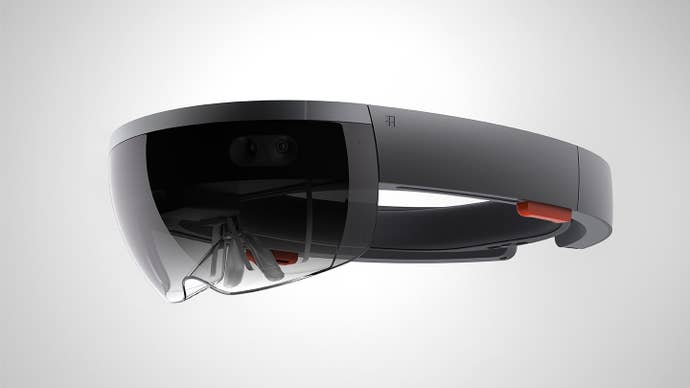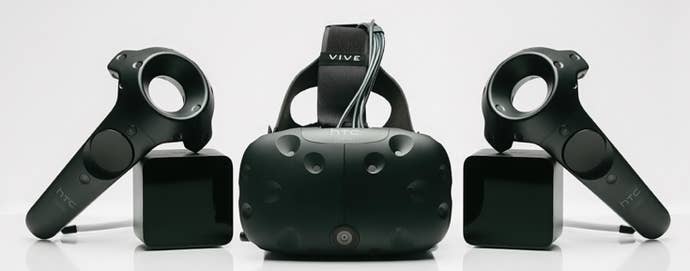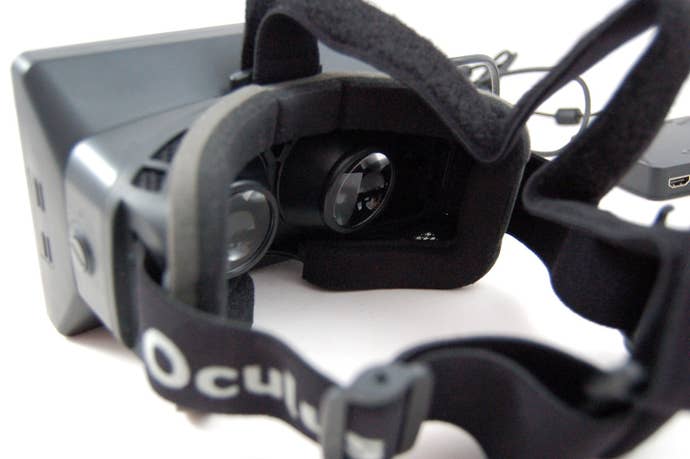USgamer Community Question: What's Your Opinion on VR Gaming?
Some say VR is the future. Others say it's a fad. What we want to know is - what do YOU think?
This article first appeared on USgamer, a partner publication of VG247. Some content, such as this article, has been migrated to VG247 for posterity after USgamer's closure - but it has not been edited or further vetted by the VG247 team.
Virtual reality is certainly one of the most interesting aspects of gaming right now, and over the past few months, we've seen an increasing number of developers jumping onto the VR bandwagon. But despite there being a great deal of hype surrounding the technology, opinions about it vary wildly. Some think it's going to be the Next Big Thing, while others feel it's niche technology for hardcore enthusiasts only. But what we want to know is - what do you think? Are you going to be an early adopter of the technology, or are you a sceptic? We're looking forward to hearing your opinion!
While you formulate your response, here's the USgamer team's take on VR tech.
Jeremy Parish, Editor-in-Chief
"Thanks, but no thanks."
The fundamental idea behind VR — immersive visuals — is a pretty great one, and it's nice that we've taken enough baby steps toward realizing the dream that corporations are willing to show their rough drafts in public, but man… the tech is not there at all. Having tried PSVR, Hololens, and Oculus are basically like being surrounded by PS3 graphics on an all-encompassing low-resolution LCD screen. It's like being wrapped in a Game Boy Advance screen while little gremlins rendered in last-generation game graphics throw stuff at you. Neat for about 30 seconds, and exhausting thereafter.
Of course, that will rectify itself in due time. But even then, that won't resolve the bigger issue, which is that wearing a bulky, clumsy headset makes for an uncomfortable experience and also makes you look like a giant tool. No one looks cool wearing VR gear, which is why you never see VR stage demos. Enticing as the prospect of paying nearly $1000 to look stupid while clumsily interacting with bad game graphics sounds… nah, I'll pass. Not to get political here (too late!), but right now I kind of see VR the way I see Donald Trump's presidential campaign: A clownish, frankly horrifying disaster that no one actually wants, and yet it just keeps hurtling inexorably forward.
Unlike Trump, VR will eventually turn out OK. The price will come down, graphics and resolution will improve, and VR devices will move more toward the Hololens end of the spectrum in terms of wearability and comfort. Also unlike Trump, VR holds tremendous promise for the fields of science and education! In the meantime, I would personally like to thank all the people with tons of disposable income for being the test cases with which VR is refined into something that doesn't resemble a comedic car wreck. I look forward to joining you crazy one-percenters circa 2024.

Jaz Rignall, Editor-at-Large
I'm an old-schooler who remembers VR when it got its first outing in the 90's. It was interesting then, and still remains interesting now, but I'm not completely enamored with the technology, despite the fact that it's evolved significantly over the years. I've played numerous VR demos, particularly Elite and Adr1ft, and while most were impressive, they remind me somewhat of 3D TV technology: It's something great to look at, but I've yet to see that killer app that makes me want to own my own pair of VR goggles.
What seems to separate most VR games from "normal" ones is the immersive experience they offer, but there's a premium to pay for that. Not just the out-of-pocket expense of purchasing a headset and needing a decent PC to run it, but also having to wear the technology which, despite strides forward in design, I still find comfortable only for short periods of time. Also, although they're good, I've yet to try a headset whose screen really blows me away. So far, the experience has always been slightly blurry for me. That might well be my long-sightedness, but if it's an issue for me, that means other people will have similar problems.
Ultimately, I think VR is guaranteed a place in gaming, especially over the long-term - but I think it will be more of a niche thing for some years to come. Something that appeals to those who really love that immersive experience, and are happy to pay the price for it. To be honest, I'm more excited about AR technology. I loved Microsoft's Hololens experience at last year's E3, and am very interested to see where it might go. Like VR, it's a long way from being perfect, but I just like the concept a little more.

Mike Williams, Associate Editor
I've lived that virtual reality life from the beginning. I tried the original show model at E3 years ago, playing Doom 3 in VR without my glasses on because the headset wasn't built for them. It was a rough experience, but the potential was apparent immediately.
The technology has only gotten better. Over time. The screens have gotten better, the hardware is much lighter and more comfortable. I can see home VR as a thing now. Unfortunately, the sticker shock is in full swing. I certainly can't afford $599 for an Oculus Rift, nor can I drop $799 on an HTC Vive. I'm pretty much hoping that PlayStation VR comes in cheaper, but I'm not really holding my breath.
Do I think virtual reality is the future video technology through which we'll consume all of our games? Lord no. that's said, I do believe VR has its place in gaming and other markets. I legitimately think it's a game-changer, once the price comes down and developers get an understanding of what the technology can really do. I never really felt that way about 3D, which definitely came across as a gimmick rather than something that would really expanding gaming.
I'm probably the closest USgamer has to a VR guy, even if I'm not as gung-ho as some of my journalistic counterparts. Hopefully, I can snag a headset sooner rather than later. I'd totally be that early adopter type if my money was right, but those are the breaks.

Kat Bailey, Senior Editor
I'm on record as being a VR skeptic. I wrote the following earlier this year:
"For now, VR's true potential remains elusive. It's certainly worth pursuing, but platform holders have yet to prove to me that it can be more than an expensive toy for hobbyists. If anything, mainstream game development is actually trending away from VR as Steam, PSN, and Xbox Live are flooded with minimalist, old-school indie games. You could argue that VR will be the 3D IMAX movie of the future - a premium experience for the biggest games of the year - but even the most expensive movie tickets will only run you about $30. It's much tougher to sell mainstream audiences on paying $599 up front for that sort of experience. So I remain a VR skeptic. I'm not willing to write off VR entirely, but neither am I going to spend the equivalent of two consoles on potential, especially when that potential may have already been reached."
That said, it's hard to deny the amount of time and money being thrown at VR. I'm in the process of prepping for the Game Developers Conference right now, and every other appointment is on Oculus, HTC Vive, or Morpheus. Developers are excited, and why not? It's always fun to experiment with new gameplay experiences. I'm just not sure that it will ever receive any kind of mainstream penetration beyond the hardcore hobbyists who want it for their cockpit games and the like. Facebook and Sony are making huge bets that VR will be the way to experiment games and media in the future, and I frankly don't see it.
Nevertheless, the momentum is undeniable. I look forward to wearing a lot of sweaty goggles at GDC.

Nadia Oxford, Staff Writer
Short answer: I think VR is here to stay. Kids are being introduced to the technology via Happy Meals and Cola-Cola, so unless they collectively reject it, I believe headsets will be a permanent part of the gaming landscape.
Long answer: Yes, VR is sticking around, but it’s not going to be a mainstay in the games industry until the companies behind the push can work out a couple of big problems.
First: Cost. Oculus Rift is $599 USD. HTC Vive is $799 USD. Prices are considerably higher outside the US, thanks to the country’s strengthening dollar. A game console is already a big investment for a family, and I can’t see the average “only-on-weekends” gamer picking one up (and if they do, it’ll probably be for a titillating web-surfing experience rather than games).
Second: There’s the issue of comfort. I suffer from motion sickness, and the prospect of even trying VR terrifies me. Just thinking of the technology gives me a headache and a flippy stomach. Valve swears the HTC Vive doesn’t cause motion sickness, but I once got barfy from a 3D Harvest Moon game. If Gaben is that confident, he should look me up as a test case.
I also have fibromyalgia, and my neck and shoulders are a bad problem area. Keeping a headset strapped to my face for any amount of time would be an issue, unless the Oculus Rift is lighter than air. I don’t think it is.
Still, I’m a child of the ‘80s and ‘90s, so I’m interested to see where VR goes from here. Bring on the neon-splashed digital dystopian worlds made of boxes and polygons!

